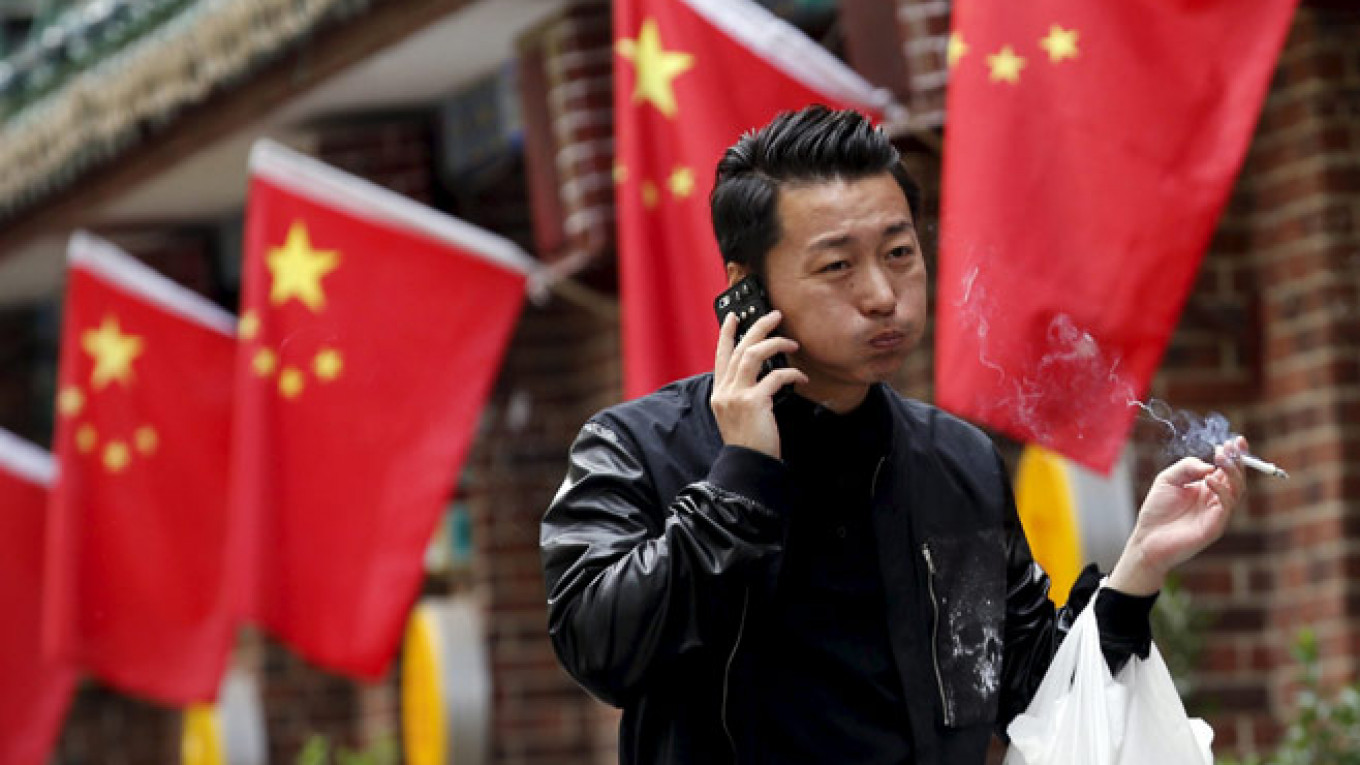Even as the flow of Western tourists to Russia decelerates due to international frictions over the Ukraine crisis, tourism from neighboring China is soaring.
Indeed, Chinese tourists last year for the first time became the largest group of foreign tourists to Russia, pushing Germany into second place, according to data from the Federal Tourism Agency. More than 1.1 million Chinese citizens visited Russia in 2014, almost 410,000 of them tourists, the agency said.
This trend has only continued this year, with the number of Chinese tourists to Russia climbing 250 percent in the first quarter compared to the same period in 2014, according to data from Russian travel association World Without Borders.
Russia’s introduction of a visa-free regime for Chinese tour groups, falling prices due to the devaluation of the ruble and blooming political relations between the two countries have all helped bring more and more Chinese tourists to Russia.
But despite this surge in popularity, Russia is not yet even among the top 10 destinations for Chinese tourists, according to data from World Without Borders — despite being just across the border.
In a bid to increase this stake, Russian tourism players are now beginning to cater to the unique demands of Chinese tourists, from hiring Chinese-speaking staff to taking on the intricacies of Chinese cuisine.
Replacing Westerners
With tensions over the Ukraine crisis hitting Russia’s image in the West and elsewhere, China is more important to the Russian tourism industry than ever.
The total flow of tourists into Russia slumped by a third last year, the head of the Federal Tourism Agency, Oleg Safonov, said earlier this year, news agency Interfax reported.
According to industry players, Russia’s annexation of Crimea from Ukraine last year and the West’s ensuing sanctions on Moscow are largely to blame for this decline in interest among foreign tourists.
Russia’s largest hospitality industry association, the Russian Tourism Industry Union, said in May that U.S. and European tourists are turning away from Russia over ideology even as tourists from other countries worry about the safety of traveling in Russia, Interfax reported.
But as tourists from other countries look elsewhere, the number of Chinese tourists is climbing thanks to growing political and economic ties between the neighbors and efforts to promote a positive image of Russia within China, experts polled by The Moscow Times said.
Russia has taken a momentous pivot toward Asia, and China in particular, as economic relations with the West come under pressure from U.S. and EU sanctions. The two countries signed a landmark $400 billion gas deal in 2014 and last month closed a raft of further economic cooperation deals, including a $25 billion deal to jump-start Chinese lending to Russian companies.
As these flourishing political and economic relations have helped boost Chinese tourism to Russia, so too have efforts to improve Russia’s image within China, said Vladimir Kantorovich, first vice president of the Association of Tour Operators of Russia (ATOR).
“Holding numerous events and presentations [in China] in order to show Russia in a favorable light has had positive results,” Kantorovich said.
Future Gold Mine
Efforts to attract visitors from China, the biggest source of outbound tourists in the world, is a growing trend worldwide.
More than 116 million Chinese people traveled abroad last year, spending a total of $160 billion, according to data from the China Outbound Tourism Research Institute, an independent institution that studies outbound Chinese tourism.
More and more countries are looking to tap into this fast-growing market, and Russia is eager not to fall behind.
In March, Russia joined Chinese Friendly International, an international association aimed at developing joint initiatives that create hospitality environments geared toward Chinese tourists.
Chinese travelers present a unique challenge to other countries’ hospitality industries. Most speak only their native language and prefer to have traditional Chinese meals every day, even when they are abroad, experts said. Some of their needs can appear peculiar to those not involved in the tourism industry.
“It’s very important for Chinese people to constantly have free access to hot drinking water,” said Anna Sibirkina, the head of China Friendly in Russia.
The project is still in early stages in Russia, with only 13 Moscow hotels participating.
Those who have joined, however, are offering a range of new services, including Chinese-language newspapers and television channels, Chinese breakfasts and Chinese-speaking staff.
Chinese travelers are less profitable for Russian tourism agencies than European and U.S. tourists, as Chinese tour operators tend to arrange everything themselves with very little participation from Russian companies, said Alexander Kurnosov, head of the committee on inbound tourism at ATOR.
But for other parts of the industry, such as hotels and restaurants, Chinese tourists — who spend an average of up to 200,000 rubles ($4,000) per trip, according to the United Nations World Tourism Organization — are promising new clientele.
Visa-Free Travel
Russia currently receives no more than 1 percent of the total number of outbound Chinese tourists, but there’s a great deal the industry and the Russian government can do to expand that share, industry experts said.
The main factor that would help attract Chinese tourists is introducing visa-free travel, ATOR’s Kurnosov said. The method has already proven effective: waiving visas for South Korean travelers helped increase the number of tourists by 58 percent last year, according to the Federal Tourism Agency.
Chinese citizens can currently come to Russia without visas when traveling as part of a group of at least five people.
Another factor that limits the flow of Chinese visitors is limited flights between the two countries.
“There are simply not enough aircraft operating between Russia and China,” said Svetlana Pyatikhatka, head of World Without Borders, adding that Russian and Chinese airlines are currently in negotiations to expand service.
Far East Casinos
Moscow is the most popular destination among Chinese visitors to Russia, with 40 percent of all Chinese tourists to Russia in the first quarter of this year bound for the Russian capital, according to data from World Without Borders.
Moscow is followed by the Amur and Primorye regions of Russia’s Far East, which are both located directly across the border with China, the report said.
The Far East has seen a flood of Chinese tourists over recent months as the ruble’s fall of some 40 percent against the U.S. dollar in 2014 enticed visitors across the border for cheap shopping trips, according to ATOR’s Kantorovich.
The generally underdeveloped area has another ace up its sleeve as well: a casino complex under construction in Primorye designed to attract gamblers from across Asia as well as Russia.
Nor are the Far East and Moscow the only areas of Russia looking for an influx of Chinese tourists. Anatoly Pakhomov, the mayor of Russia’s southern resort city of Sochi, recently announced that direct flights from China will be launched in September, enabling up to 2 million Chinese tourists to visit the city every year, news agency RIA Novosti reported.
Contact the author at [email protected]
A Message from The Moscow Times:
Dear readers,
We are facing unprecedented challenges. Russia's Prosecutor General's Office has designated The Moscow Times as an "undesirable" organization, criminalizing our work and putting our staff at risk of prosecution. This follows our earlier unjust labeling as a "foreign agent."
These actions are direct attempts to silence independent journalism in Russia. The authorities claim our work "discredits the decisions of the Russian leadership." We see things differently: we strive to provide accurate, unbiased reporting on Russia.
We, the journalists of The Moscow Times, refuse to be silenced. But to continue our work, we need your help.
Your support, no matter how small, makes a world of difference. If you can, please support us monthly starting from just $2. It's quick to set up, and every contribution makes a significant impact.
By supporting The Moscow Times, you're defending open, independent journalism in the face of repression. Thank you for standing with us.
Remind me later.






